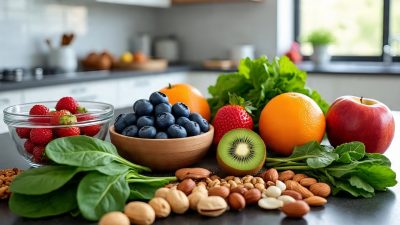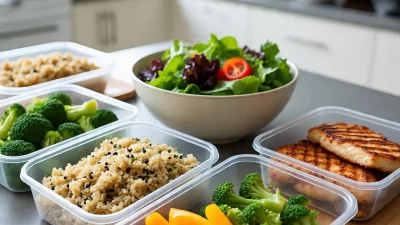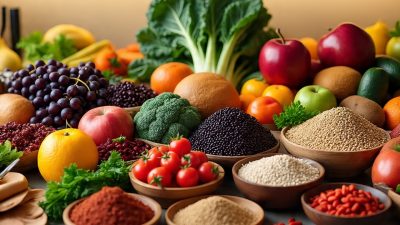If you’re dealing with chronic pain, constant fatigue, joint stiffness, or bloating—you’re not alone. Inflammation is at the root of many health conditions including arthritis, gut issues, heart disease, and even brain fog.
The good news? You can reduce inflammation—naturally and quickly—by changing what you eat.
This guide covers:
- What inflammation is and why it matters
- The best foods that help reduce inflammation fast
- Easy anti-inflammatory meal ideas
- Foods you should avoid
Let’s dig in—because food is medicine.
Contents
- 1 What Is Inflammation, and Why Is It a Problem?
- 2 10 Best Foods That Help Reduce Inflammation Fast
- 3 1. Turmeric (with Black Pepper)
- 4 2. Fatty Fish (Salmon, Sardines, Mackerel)
- 5 3. Leafy Greens (Spinach, Kale, Swiss Chard)
- 6 4. Berries (Blueberries, Strawberries, Raspberries)
- 7 5. Avocados
- 8 6. Ginger
- 9 7. Extra Virgin Olive Oil
- 10 8. Nuts and Seeds (Walnuts, Flaxseeds, Chia Seeds)
- 11 9. Garlic
- 12 10. Green Tea
- 13 Sample Anti-Inflammatory Meal Plan (1-Day)
- 14 Easy Anti-Inflammatory Recipes
- 15 Foods to Avoid If You Have Inflammation
- 16 Quick Tips for Eating Anti-Inflammatory Every Day
- 17 Final Thoughts
- 18 FAQ
What Is Inflammation, and Why Is It a Problem?
Inflammation is your body’s natural response to injury, infection, or stress. It’s part of the healing process.
Acute inflammation (like swelling after an injury) is normal. But chronic inflammation is a silent threat. It stays “on” even when there’s no danger, damaging tissues and organs over time.
Chronic inflammation is linked to:
- Arthritis and joint pain
- Gut issues like IBS or leaky gut
- Heart disease and high blood pressure
- Type 2 diabetes
- Autoimmune disorders
- Skin issues like eczema or acne
- Brain fog and depression
What you eat directly impacts inflammation levels. Certain foods fuel it, while others fight it.
10 Best Foods That Help Reduce Inflammation Fast
Here are the best science-backed anti-inflammatory foods that can make a real difference—fast.
1. Turmeric (with Black Pepper)
Turmeric contains curcumin, a powerful anti-inflammatory compound. Pairing it with black pepper increases its absorption by up to 2000%.
Meal Idea:
- Golden turmeric latte with almond milk and a pinch of black pepper
- Add turmeric to scrambled eggs, rice, or soups
2. Fatty Fish (Salmon, Sardines, Mackerel)
These fish are rich in omega-3 fatty acids (EPA and DHA), which are known to reduce inflammation and joint pain.
Meal Idea:
- Grilled salmon with quinoa and roasted vegetables
- Sardine avocado toast on whole grain bread
3. Leafy Greens (Spinach, Kale, Swiss Chard)
Dark leafy greens are loaded with antioxidants, vitamins A and C, and polyphenols that fight cellular damage.
Meal Idea:
- Kale and quinoa salad with lemon-olive oil dressing
- Spinach and mushroom omelette for breakfast
4. Berries (Blueberries, Strawberries, Raspberries)
Berries are packed with anthocyanins, which reduce oxidative stress and inflammation.
Meal Idea:
- Berry chia pudding with almond milk
- Blueberries in Greek yogurt or oatmeal
5. Avocados
Avocados contain monounsaturated fats, potassium, magnesium, and fibre—all of which help reduce inflammation.
Meal Idea:
- Avocado toast with hemp seeds and chili flakes
- Add slices to salads or smoothies
6. Ginger
Ginger works similarly to NSAIDs (like ibuprofen) by blocking inflammatory pathways in the body.
Meal Idea:
- Ginger tea with lemon and honey
- Grate fresh ginger into stir-fries or smoothies
7. Extra Virgin Olive Oil
Rich in oleocanthal, olive oil has anti-inflammatory effects similar to ibuprofen.
Meal Idea:
- Drizzle on salads, veggies, or whole grain toast
- Use as your go-to cooking oil at low heat
8. Nuts and Seeds (Walnuts, Flaxseeds, Chia Seeds)
Nuts and seeds are packed with healthy fats, fibre, and plant-based omega-3s.
Meal Idea:
- Add flax or chia seeds to oatmeal or smoothies
- Snack on a handful of walnuts and almonds
9. Garlic
Garlic contains sulphur compounds that enhance immune function and reduce inflammation markers.
Meal Idea:
- Roast whole garlic cloves and spread on toast
- Add to soups, stews, or hummus
10. Green Tea
Rich in EGCG (epigallocatechin gallate), green tea is a potent anti-inflammatory and antioxidant drink.
Meal Idea:
- Brew and sip green tea between meals
- Use it in smoothies or iced teas with lemon
Sample Anti-Inflammatory Meal Plan (1-Day)
Here’s a full day of inflammation-fighting meals using the ingredients above:
Breakfast:
- Berry chia pudding made with almond milk, chia seeds, blueberries, and flaxseeds
- Green tea with lemon
Lunch:
- Grilled salmon salad with kale, avocado, cherry tomatoes, and extra virgin olive oil
- Sparkling water with ginger slices
Snack:
- A small bowl of mixed nuts (walnuts, almonds)
- Turmeric latte with black pepper
Dinner:
- Stir-fried veggies (broccoli, bell peppers, spinach) with garlic and ginger
- Quinoa cooked in vegetable broth
- A few slices of fresh mango for dessert
Easy Anti-Inflammatory Recipes
Read : Top Superfoods to Improve Gut Health Naturally
Golden Turmeric Lentil Soup
Ingredients:
- 1 tbsp olive oil
- 1 onion, diced
- 2 garlic cloves, minced
- 1 tsp turmeric
- 1 tsp grated ginger
- 1 cup red lentils
- 4 cups veggie broth
- 1 cup chopped carrots
- Salt, pepper, and a pinch of black pepper
Instructions:
- Sauté onion, garlic, turmeric, and ginger in olive oil.
- Add lentils, carrots, broth. Simmer 25–30 minutes.
- Blend or leave chunky. Enjoy with lemon juice on top.
Avocado Kale Salad with Lemon Dressing
Ingredients:
- 2 cups chopped kale
- ½ avocado, cubed
- 1 tbsp olive oil
- Juice of ½ lemon
- Salt and pepper
- Optional: pumpkin seeds or hemp hearts
Instructions:
- Massage kale with olive oil and lemon juice.
- Add avocado and toppings. Toss and enjoy.
Foods to Avoid If You Have Inflammation
Just as some foods fight inflammation, others fuel it. Try to limit or avoid these:
| Pro-Inflammatory Foods | Why to Avoid |
|---|---|
| Refined carbs (white bread, pastries) | Spike blood sugar, trigger inflammation |
| Sugar (soda, candy, syrups) | Increases inflammatory cytokines |
| Processed meats (bacon, sausage) | Linked to gut inflammation |
| Fried foods | Loaded with inflammatory omega-6 fats |
| Trans fats (hydrogenated oils) | Cause oxidative stress |
| Dairy (in some people) | May trigger bloating, acne, or gut issues |
| Alcohol (in excess) | Damages gut lining and liver |
Quick Tips for Eating Anti-Inflammatory Every Day
- Cook with colour: The more colours on your plate, the more antioxidants you’re getting.
- Drink more water: Staying hydrated helps flush out inflammation by-products.
- Read labels: Avoid hidden sugars and processed oils.
- Batch prep meals: Having healthy food ready makes it easier to stay consistent.
- Don’t skip meals: Skipping meals can trigger stress hormones, increasing inflammation.
Final Thoughts
Reducing inflammation doesn’t have to mean restrictive diets or expensive supplements. It starts with choosing the right foods—foods that nourish your body and calm the fire within.
By incorporating these foods that help reduce inflammation fast into your daily meals, you’ll not only ease pain and discomfort, but also improve digestion, mood, skin, and overall vitality.
Consistency is key. Even one anti-inflammatory meal per day can start making a difference.
FAQ
What are the best foods to reduce inflammation quickly?
Some of the best anti-inflammatory foods include fatty fish (like salmon), leafy greens (such as spinach and kale), berries, turmeric, ginger, olive oil, and nuts. These are rich in antioxidants and omega-3 fatty acids that help reduce inflammation fast.
How do anti-inflammatory foods work in the body?
Anti-inflammatory foods help by reducing the levels of inflammatory markers in the body. They contain antioxidants, polyphenols, and healthy fats that combat oxidative stress and support immune function.
Can certain meals help reduce inflammation fast?
Yes! Meals like a salmon and quinoa bowl with leafy greens, turmeric lentil soup, or a berry smoothie with chia seeds are excellent choices. These meals combine multiple anti-inflammatory ingredients for fast relief.
How quickly can I feel the effects of an anti-inflammatory diet?
Some people feel improvements in just a few days, especially with reduced bloating, joint pain, or fatigue. However, consistent intake over several weeks provides the best long-term benefits.
What foods should I avoid to reduce inflammation?
Avoid ultra-processed foods, added sugars, refined carbs, fried items, and excessive red or processed meats. These can trigger or worsen inflammation in the body.
Is it safe to eat anti-inflammatory foods every day?
Absolutely. Most anti-inflammatory foods are nutrient-dense and safe for daily consumption. In fact, making them a regular part of your diet can improve overall health and reduce the risk of chronic diseases.


